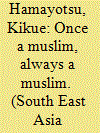| Srl | Item |
| 1 |
ID:
117064


|
|
|
|
|
| Publication |
2012.
|
| Summary/Abstract |
It is commonly assumed that greater enforcement of Syariah [Islamic law] is the result of growing Islamism in civil society and/or the state. This article investigates the most burning political issue relating to the state enforcement of Syariah in contemporary Malaysia, that of apostasy. The author argues that it is the electoral imperative of the secular Muslim ruling elites, especially prime ministers, to cultivate broader support to achieve political survival, not only among their traditional power base in the rural Muslim constituencies, as is conventionally argued, but equally importantly among the urban non-Muslim (especially Chinese) constituencies, which has also conditioned the state enforcement of Syariah. The author's findings from Malaysia and observations on Indonesia further suggest that electoral competitiveness - rather than authoritarianism or theocracy - conditions state enforcement of Syariah, contrary to expectations.
|
|
|
|
|
|
|
|
|
|
|
|
|
|
|
|
| 2 |
ID:
143893


|
|
|
|
|
| Summary/Abstract |
Islam was officially installed as the religion of the Federation of Malaya upon independence on 31 August 1957, and retained as such after the formation of Malaysia on 16 September 1963. Since then, political stakeholders have not shied away from making the most of Islamic symbols, practices and institutions towards achieving national economic development or regime maintenance. Driven by hegemonic considerations, they largely ignored intra-Muslim religious variations. The religious uniformity of Malays, all of whom were Muslims by law, were literally taken for granted and served as a politically expedient vehicle for Islamic-based political mobilization by the Malay-dominated regime. Pluralist conceptions of Malaysian society were accepted only insofar as they pertain to Muslim-non-Muslim distinctions. At the core of the government’s efforts to infuse the Malaysian polity with Islamic alternatives for socio-political arrangements is a gradual process of syariahization. However, owing to arbitrary interpretations of the syariah (Islamic law) by Malaysia’s official Islamic gatekeepers, syariahization resulted in state-manufactured denial of freedom of religious expression to non-conformist Malay-Muslims. Until today, Muslim non-conformists are not allowed to adopt, let alone to propagate, different forms of Islam that run afoul of the version upheld by an officially sanctioned version of the syariah. As reflected by the case of the Sufi-inspired Darul Arqam movement, government-imposed syariahization has resulted in the violation of fundamental human rights of Malay-Muslims, regardless of the fact that the syariah itself may not have been clear-cut in determining the boundaries between religious orthodoxy and unorthodoxy in prescribing punishments for dissent.
|
|
|
|
|
|
|
|
|
|
|
|
|
|
|
|